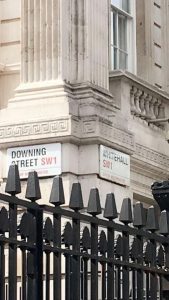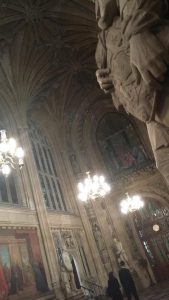
With Parliament closed to visitors up until the 1st of September at the earliest, I thought it would be the perfect time to reflect on my work experience with Hilary Benn last summer.
In July of 2019, I spent a week shadowing Hilary in his Parliament office. This involved a range of office work, following Hilary around and listening to speeches in both chambers of the House of Commons.
“I have often been disheartened by the lack of engagement with politics, but the constant letters from consistuents really reassured me that there are still people out there who are passionate about political issues.”
Office work was by far the most mundane task of my whole week. From stacking different sized envelope piles to sending the same templated email to fifty constituents, some of the perceived glamour of Parliament was diminished. Whilst this seemed like a slog at times, I think it is really important that people are exposed to these tasks before working in Parliament full time, in order to understand the realities of what is involved in the job. Being an MP isn’t simply just making speeches and having a few photo ops – there’s so much preparation which comes with it. I was also amazed to see how much communication there actually was with Hilary. I have often been disheartened by the lack of engagement with politics, but the constant letters from consistuents really reassured me that there are still people out there who are passionate about political issues.
A lot of the admin work for Hilary also involved a lot of research through the House of Commons library. Having completed three essay based subjects at A-Level I was primed for the task. In all seriousness though, researching into complex issues and compiling them into simple research reports for Hilary’s speeches really made me value just how complex legislation can be on an issue and how there is often more nuances to legislation than you would originally consider. Seeing this research translated into speechs and questions to the government came with much satisfaction.

In the midst of Brexit debates, heated arguments in select committee meetings also displayed the rife partisan nature of UK politics at this current time. As chair of the Brexit committee, formally known as the Committee on the Future Relationship with the European Union, it is Hilary’s job to scrutinise government policy relating to negotiations with the EU on our future relationship. Yet, whenever questions were posed to the government, it struck me how rehearsed their responses have become. Scrutiny of government policy seems virtually impossible as they fail to recognise any flaws in their decision making and constantly come out with the same repetitive answers. On the other side of the debate there is a similar level of rehearsed rhetoric. With some parties still failing to recognise the referendum result, I noticed just how divisive one electoral decision had made UK politics.
But perhaps it has always been like this. Whilst the vast difference in opinions is frustrating and parties don’t seem to want to cooperate, ultimately it highlights the variety of views within the UK, having such a diverse population.
Yet when these politicians weren’t in debates, I was reminded of the fact that they are ultimately human as they would joke with members of the opposite party in the lunch queue at portcullis house. I even ended up having ‘banter’ with Harriet Harman in the lunch queue on one ocassion over whether I was being made to do too much boring admin work. I often found the seriousness of watching politicians to be very alienating, making them unapproachable, yet, getting to see them throughout the working day, I soon worked out that they are ultimately no different to anybody else.
A lot of an MP’s job also involves attending events and reaching out to charities. On my week of work experience, we attended an event run by the Alzeihmer’s Society to raise awareness of their charity. This one hit me particularly hard as my grandad currently has dementia. It was so powerful to see the work this charity was doing in order to support families dealing with the rising costs of social care. I was especially encouraged by the number of MPs who actually showed up to the event, highlighting how this was an issue which they actually care about and want to address in their legislation.
I have the best job in the world. In between lives from central lobby (perhaps the finest spot in Britain) can pop into the House of Commons to observe some of the most important debates of our recent history. Lucky man.
— Lewis Goodall (@lewis_goodall) September 9, 2019
Another key part of an MP’s job is reaching out to the media and partaking in interviews. This seems to be the most hated element of the job by politicians as they fear they’ll slip up, but as a journalist myself it was the part which I most enjoyed watching. For one of Hilary’s interviews, I had the pleasure of going along, all be it to the central lobby where there are a set of headphones and two mics where radio interviews take place. Seeing two MPs with opposing views on Brexit trying to navigate the workings of a radio interview was a comical sight but interesting nonetheless. Personally, I think it’s really important that MPs are able to stay engaged with the media as this is one of the most important means of political communication and a clear way of staying accountable to the general public.
“The political excitment of being in the chamber stuck with me for the whole week.”
When I met Chris Mason for a coffee at the end of my work experience, he said there was nothing he loved more than being in the chamber when historic speeches took place or key electoral decisions were announced, and I couldn’t agree more. The political excitment of being in the chamber stuck with me for the whole week.
Don’t get me wrong, Parliament is far from perfect. It could certainly benefit from change in terms of representation and one important step forward would be the entire revoking of the hereditary peer status in the House of Lords and the easier removal of Lords for misproper conduct. Once both chambers of the commons start to better reflect the diversity in the UK, this will help to bring about policy change as MPs will better understand the needs of their constituents.
Being in Parliament for a week reminded me of how fundamental this institution is to our country. Not only does it form laws but it embodies our fundamental principles of democracy as it is reeped in years of important history. It was an honour to roam around the corridors of such a historic building freely, being reminded of all the famous figures who were once in Parliament too.
I hope to return to Parliament one day, when it is safe to do so. Yet, until then, I will continue to reminisce about my time spent there and enjoy watching debates from the comfort of my living room.
Lauren McGaun
Follow @lauren_mcgaun
Images courtesy of Lauren McGaun.

